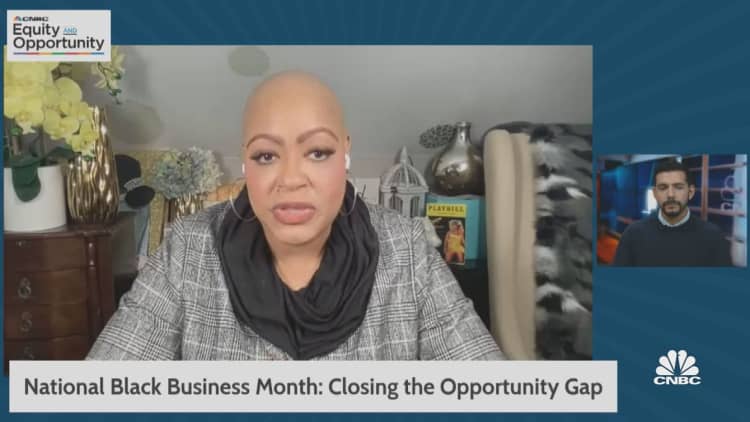
Major retailers and brands have contributed $14 billion in revenue to Black-owned businesses since May 2020.
Over the past three years, Nordstrom, Macy’s, Sephora, Ulta Beauty, and 25 other companies have partnered with the nonprofit organization Fifteen Percent Pledge. This group aims to have companies allocate 15% of their shelf space to Black-owned brands, in line with the Black community’s representation of 15% in the U.S. population.
Before joining the pledge, these partners had less than 3% of their shelf space dedicated to Black-owned brands. Now, they are committed to achieving the 15% goal over a 10-year contract.
“Let’s create an opportunity to chart a path forward that’s more inclusive and gives Black entrepreneurs, who have historically been excluded, a chance to build generational wealth,” said LaToya Williams Belfort, executive director of the Fifteen Percent Pledge.
The Fifteen Percent Pledge has set a goal of generating $1.4 trillion in wealth for Black entrepreneurs by 2030.
Sephora was the first major retailer to commit to the pledge, following Aurora James’ call to action on Instagram after the murder of George Floyd. James urged corporations to support Black-owned businesses as a way to give back to the communities they serve.
The Fifteen Percent Pledge was established in 2020 to promote corporate support for Black-owned businesses amid an increased focus on diversity, equity, and inclusion.
According to Federal Reserve data from March 2023, Black household wealth in the U.S. amounts to $6.25 trillion, only 5% of the total wealth held by white households ($115.65 trillion). Additionally, only 4% of America’s largest companies had successfully closed the racial pay gap in 2022.
More than two dozen companies, including apparel and furniture retailers, lifestyle publications Vogue & InStyle, and cannabis dispensary chain MedMen, have taken the pledge.
Over 625 Black-owned businesses and brands have formed partnerships with corporations that have signed the pledge.
Christina Tegbe, founder of African luxury beauty brand ’54 Thrones’ inspired by the richness, diversity, and culture of Africa and its people.
54 Thrones
“We launched in retail in 2020 with Nordstrom,” said Christina Tegbe, founder of Black beauty brand 54 Thrones and a partner of the Fifteen Percent Pledge.
Since gaining attention in 2020, the company has experienced exponential growth.
“From 2016 to 2019, we had sales in the four-figure range,” Tegbe explained. “After May 2020 and with the work being done by the Fifteen Percent Pledge, we saw ourselves having five-figure days.”
Tegbe praised the Fifteen Percent Pledge for pressuring retailers to seek out and support Black-owned brands, which gave her company the exposure it deserved. 54 Thrones products are now available at retailers such as Sephora, Nordstrom, Credo Beauty, and Goop.
In August 2022, Nordstrom launched its first Black Business Month program, featuring a “Buy Black” pop-up market that showcased brands like 54 Thrones. The initiative generated $14 million in sales of Black-owned or founded brands at Nordstrom in that month alone.
Nordstrom is now launching a new multi-city initiative to further promote Black-owned brands and work towards its commitment of delivering $500 million in retail sales from brands owned, operated, or designed by Black and Latinx individuals by 2025.
“We’re seeking companies with a significant economic footprint that want to be more inclusive and contribute to a more inclusive society,” said Williams Belfort.
Pushback against DEI goals
Corporate efforts to support diversity, equity, and inclusion face opposition from lawmakers, making it a challenging landscape to navigate.
Recently, a conservative legal organization filed a lawsuit against Target, accusing the retailer of misrepresenting its risk monitoring of LGBTQ-themed merchandise during Pride month.
This lawsuit highlights the ongoing legal battles between conservative groups and companies with policies promoting racial and gender inclusion.
Anheuser Busch InBev, the parent company of Bud Light, experienced a decline in U.S. sales after facing consumer boycotts due to an advertising partnership with transgender influencer Dylan Mulvaney.
Tegbe expressed concern about the backlash against DEI initiatives, fearing that companies might pull back and avoid public statements of support.
Despite these challenges, Tegbe remains hopeful that the majority of consumers are interested in purchasing products from diverse founders.
“Companies need to take a strong and unapologetic stance when implementing significant changes or revolutions,” she emphasized.
According to Williams Belfort, the success of the Fifteen Percent Pledge is evident in the data.
“The data shows that providing opportunities for Black entrepreneurs, driving revenue for retailers, and strengthening the economy benefits everyone,” she concluded.
Denial of responsibility! VigourTimes is an automatic aggregator of Global media. In each content, the hyperlink to the primary source is specified. All trademarks belong to their rightful owners, and all materials to their authors. For any complaint, please reach us at – [email protected]. We will take necessary action within 24 hours.


